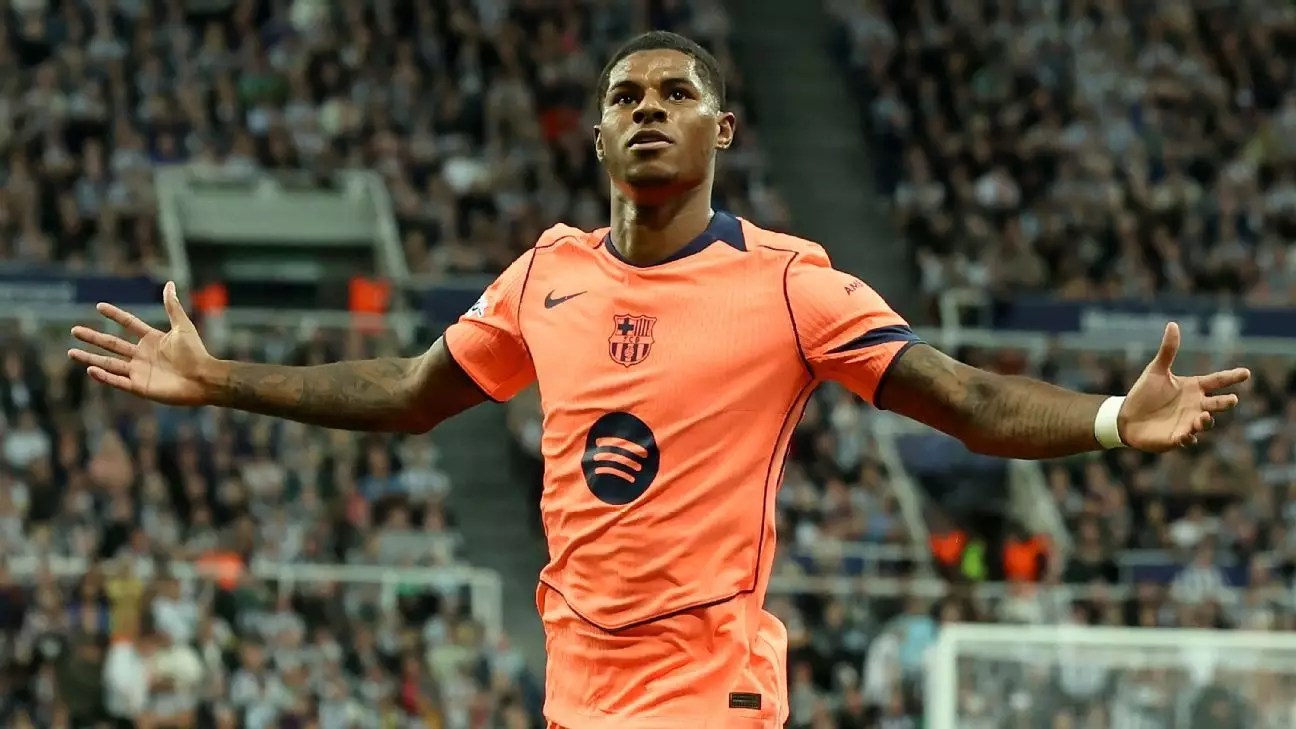In the realm of top-tier football, moments of brilliance often serve as catalysts for transformation. Marcus Rashford’s recent display against Newcastle exemplifies this phenomenon. The English forward, on loan from Manchester United, stepped into the European spotlight with assertiveness and skill that electrified the Stade de St. James’. Striking a perfect balance between individual talent and tactical maturity, Rashford demonstrated that perseverance can culminate in game-changing moments, even when initial performances appear underwhelming.
His opening goal—a precise header—was not merely a stroke of luck, but a testament to his evolving understanding of positioning and timing. Then, in a feat of audacious confidence, Rashford unleashed an unstoppable long-range shot that silenced critics and energized his teammates. Such a display underscores that talent alone is insufficient; it must be complemented by mental resilience and tactical intelligence. His performance signals a crucial turning point, yet the narrative doesn’t end here. Progress requires consistent effort, adaptability, and an insatiable desire to elevate one’s contribution—traits Brennan Flick recognized when calling it the “first step” in Rashford’s Barcelona journey.
This moment illuminates how pivotal individual development is within the collective success of a club. Rashford’s newfound confidence embodies the broader philosophy at Barcelona: fostering young talent and transforming potential into excellence. It’s a reminder that high-stakes environments demand players to transcend previous limitations and embrace continuous growth—a process both arduous and exhilarating.
Strategy Meets Confidence: The Art of Reinventing the Modern Forward
Barcelona’s decision to acquire Rashford on loan from Manchester United signals a strategic gamble rooted in both talent assessment and future potential. The Catalan club, renowned for its attacking philosophy, recognizes that a player of Rashford’s caliber can redefine their offensive dynamism. His recent performances suggest that, given the right environment and support, a striker’s true capabilities can flourish beyond expectations.
Flick’s praise reveals an understanding that success lies in mental fortitude, technical mastery, and tactical implementation. Rashford’s ability to score under pressure, especially from outside the box, echoes the increasing importance of versatile forwards in contemporary football. They are no longer mere goal poachers but creators of chaos, capable of unlocking defenses with ingenuity and power.
Barcelona’s strategic reinvention hinges on fostering such multidimensional attackers. Rashford’s evolution embodies the club’s broader ambition: to blend youthful exuberance with tactical discipline. This reinvention is vital as modern football gravitates toward faster, more unpredictable gameplay where players are expected to contribute in multiple phases of attack.
The Psychological Edge: Building Confidence in High-Pressure Environments
The significance of Rashford’s goals extends beyond the scoreboard; they symbolize psychological breakthroughs for the player and his team. Scoring in a challenging environment like St. James’ Park underlines his mental resilience—an essential trait at the elite level. Flick’s emphasis on confidence underscores how crucial self-belief is for unlocking peak performance.
Such moments serve as affirmations that overcoming adversity and embracing high-pressure situations can lead to growth. For Barcelona, integrating players like Rashford requires more than technical training; it necessitates cultivating a mindset conducive to embracing challenges and learning from setbacks. His improved finishing from distance in the second half reflects not just physical skill but also a matured mental approach, transforming doubt into decisive action.
Furthermore, Rashford’s burgeoning confidence impacts his teammates, creating a ripple effect that elevates the entire squad’s morale. When a player of his caliber demonstrates resilience and adaptability, it reinforces the collective belief that the team’s aspirations are achievable. Indeed, building this psychological edge is perhaps the most profound contribution of his recent performances—a catalyst that can propel Barcelona toward their coveted Champions League title.
Strategic Ambition vs. Real-World Challenges
Barcelona’s pursuit of European glory is an ambitious journey fraught with challenges, as evidenced by their semi-final exit last season. The addition of Rashford indicates a strategic response—an effort to inject dynamism and unpredictability into their attack. Nonetheless, as Newcastle’s coach Eddie Howe pointed out, achieving greatness requires consistent quality and mental toughness. Near misses, missed chances, and thin margins reveal how fragile success can be.
The night at St. James’ Park exemplifies this dichotomy: moments of brilliance contrasted with missed opportunities. Newcastle’s inability to capitalize on chances underscores how crucial finishing and composure remain in tight contests. For Barcelona, the challenge isn’t just talent acquisition but creating an environment where skills translate into tangible results.
Despite the hurdles, the confidence emerging from Rashford’s performance suggests that the team is on an upward trajectory. The club’s strategic moves, pairing seasoned tacticians with young, ambitious players, reflect a broader revolution in football where agility, creativity, and mental resilience coexist. Success in Europe demands not only individual brilliance but an unwavering collective will—qualities Rashford appears eager to exemplify.
The Future of the Modern Attacker: Beyond the Goal
Rashford’s goals symbolize more than individual achievement; they represent the archetype of the modern footballer—adaptable, confident, and relentless. His willingness to take on defenders and strike from unexpected angles aligns with the evolving demands placed on forwards in the contemporary game. These players are no longer confined to the penalty box but are pivotal in orchestrating attacks from deep positions and outside the box.
Barcelona’s pursuit of this new era reflects their recognition that versatility and mental strength are as vital as technical prowess. Rashford’s emergence as a key figure demonstrates that success hinges on embracing risk and innovation. His journey underscores that players must continually refine their craft and mindset to stay ahead of the competition.
This evolution isn’t only about individual exploits but about transforming the collective identity of a team. As Rashford develops, so too does Barcelona’s ambition to redefine how teams win in the modern era. With a blend of youthful energy, tactical acumen, and unshakeable confidence, the club seems poised to lead a renaissance—one where individual brilliance fuels collective triumph, and every player strives for that next step forward.


Leave a Reply